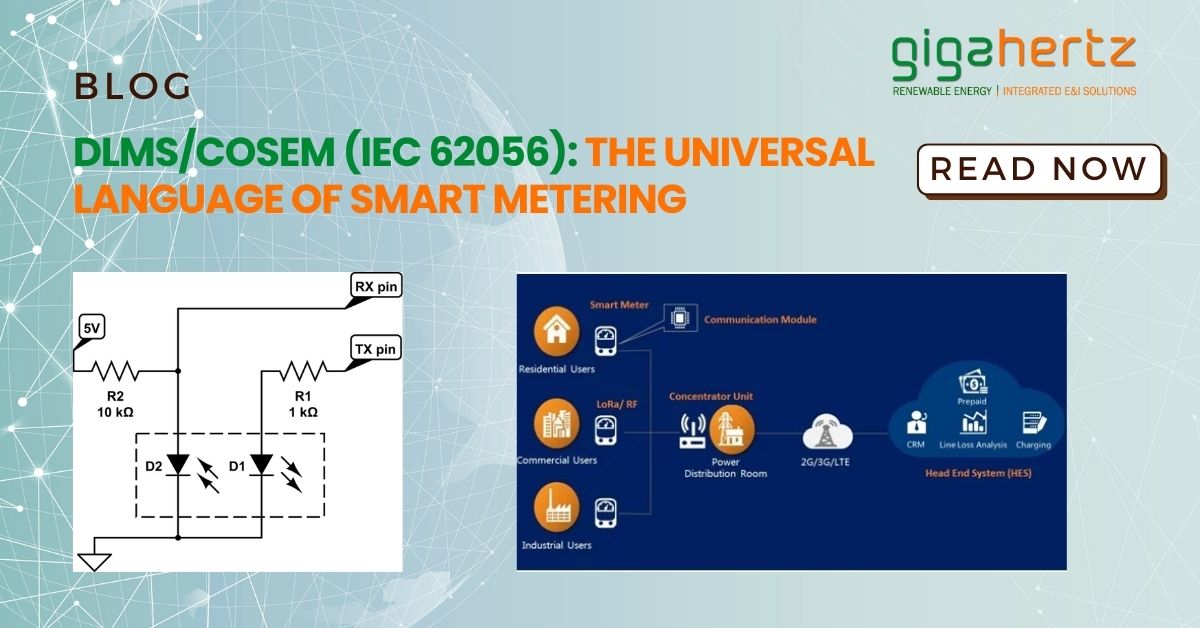
In
today’s digital utility landscape, reliable communication with energy meters is
critical. Whether it’s for billing, grid monitoring, energy auditing, or theft
detection, the ability to exchange data seamlessly and securely is a
must. That’s where DLMS/COSEM, the globally adopted smart metering
standard, steps in.
What is DLMS/COSEM?
DLMS/COSEM stands for:
- DLMS –
Device Language Message Specification
- COSEM –
Companion Specification for Energy Metering
Together,
DLMS/COSEM forms the foundation of IEC 62056, the international standard
for data exchange with energy meters. It’s not just a protocol—it’s a framework
that defines how to communicate and what to communicate with
utility devices.
Why It Matters
Utilities
across the globe use meters from different manufacturers. Without a common
language, integrating these into a single system would be a nightmare.
DLMS/COSEM solves this by:
- Standardizing
data structures (COSEM objects)
- Providing
communication rules (DLMS services)
- Enabling
interoperability and multi-vendor integration
Architecture: Layer by Layer
DLMS/COSEM
is built on the OSI model and supports various transport and physical
layers:
|
Layer |
Function |
Example Technology |
|
Application
Layer |
DLMS
commands and object access |
Read/Write,
Associations |
|
Transport
Layer |
Session
handling |
TCP/IP,
HDLC, COSEM wrappers |
|
Physical
Layer |
Media
for data transmission |
RS-485,
Optical, PLC, GPRS |
This
flexibility allows it to operate across wired and wireless networks,
making it ideal for modern AMI (Advanced Metering Infrastructure).
COSEM Object Model
At its
core, every meter holds data in the form of COSEM objects, which are
grouped into standard interface classes. These are accessed using OBIS
codes (Object Identification System).
Example COSEM Classes:
|
Interface Class |
Function |
Example OBIS Code |
|
Data
(IC #1) |
Simple
values |
1-0:1.8.0
(kWh import) |
|
Register
(IC #3) |
Value +
scaler/unit |
1-0:32.7.0
(Voltage) |
|
Clock
(IC #8) |
Date
and time |
0-0:1.0.0 |
|
Profile
Generic (IC #7) |
Historical
data/logs |
Load
profile channels |
With this
structure, any utility can read energy, voltage, current, demand, power
factor, and even tamper or event logs, no matter the meter make.
Security in DLMS/COSEM
DLMS/COSEM
includes robust security features:
- Authentication
(Low, High, HighGMAC)
- Encryption
(AES-GCM 128-bit)
- Access
Control based on security levels
This is
critical in environments where cybersecurity of OT (Operational Technology)
is a growing concern.
Communication Modes
DLMS/COSEM
supports both pull and push communication:
- Pull
Mode:
Head-end system (HES) or SCADA requests meter data
- Push
Mode:
Meter sends data automatically at intervals or on trigger
- Local
Access: Via optical port using IEC 62056-21
- Remote
Access: Using TCP/IP over Ethernet, GPRS, or LTE
This
ensures compatibility with both legacy and smart infrastructure.
Applications
in the Power Sector
DLMS/COSEM
is widely used in:
- ABT
Metering (Availability-Based Tariff)
- Substation
Automation
- Hybrid
PPC Panels (Wind + Solar integration)
- Energy
Audits
- Load
Profiling and Theft Detection
- Grid
Balancing via SCADA Integration
Real-World Example: DLMS in Hybrid Power Plants
In a
hybrid plant with 70 MW Wind + 130 MW Solar, DLMS/COSEM-enabled ABT
meters feed real-time data into the Hybrid PPC Panel, which controls
generation and ensures compliance with SLDC instructions. The data is accessed
via DLMS TCP/IP, aggregated, and pushed to SCADA for monitoring and
forecasting.
Key Benefits
- International
Standard (IEC 62056)
- Multi-vendor Interoperability
- End-to-End Security
- Flexible Communication Channels
- Rich Data Model (OBIS + COSEM)
The Future:
DLMS + Smart Grid
As India
moves toward smart grids, IoT integration, and AI-based energy
optimization, DLMS/COSEM will remain a cornerstone of metering
communication, enabling utilities to manage energy efficiently, securely, and
intelligently.
Conclusion
DLMS/COSEM
isn’t just a protocol—it’s the heartbeat of modern metering infrastructure.
For DISCOMs, OEMs, EPCs, and SCADA vendors, mastering DLMS/COSEM is essential
to unlocking the full potential of digital energy systems.
Category: DLMS/COSEM
